初二英语第一二单元的知识点整理
仁爱版英语八年级上册1-2单元知识点归纳
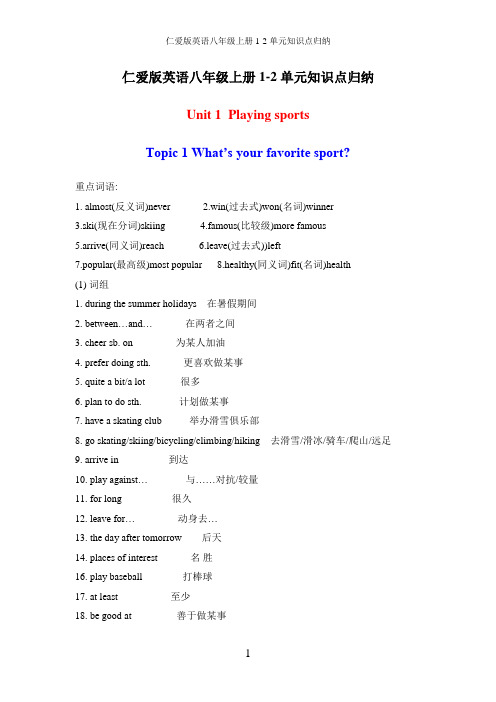
仁爱版英语八年级上册1-2单元知识点归纳Unit 1 Playing sportsTopic 1 What’s your favorite sport?重点词语:1. almost(反义词)never2.win(过去式)won(名词)winner3.ski(现在分词)skiing4.famous(比较级)more famous5.arrive(同义词)reach6.leave(过去式))left7.popular(最高级)most popular 8.healthy(同义词)fit(名词)health(1) 词组1. during the summer holidays 在暑假期间2. between…and…在两者之间3. cheer sb. on 为某人加油4. prefer doing sth. 更喜欢做某事5. quite a bit/a lot 很多6. plan to do sth. 计划做某事7. have a skating club 举办滑雪俱乐部8. go skating/skiing/bicycling/climbing/hiking 去滑雪/滑冰/骑车/爬山/远足9. arrive in 到达10. play against…与……对抗/较量11. for long 很久12. leave for…动身去…13. the day after tomorrow 后天14. places of interest 名胜16. play baseball 打棒球17. at least 至少18. be good at 善于做某事19. take part in 参加20. all over the world 全世界21. be good for 对……有益22. a good way 一种好方法23. keep fit/healthy 保持健康24. relax oneself 放松某人自己重点句型25. What’s your favorite sport? = What sport do you like best? 你最喜爱的运动是什么?26. Which sport do you prefer? = Which sport do you like better? 你更喜欢什么运动?I prefer skating. = I like skating better. 我更喜欢滑雪.27. Do you skate much? = Do you often skate? 你常滑雪吗?28. She spends at least half an hour in the gym every day. 每天她至少花半小时在体育馆.29. She plays baseball pretty well and she is also good at jumping.她棒球打得相当好而且擅长于跳.30. What kind of sports do you like? = Which sport do you like? 你喜欢哪种运动? 重点语言点31. see sb. do sth “看见某人做了某事” 强调动作的全过程,常与every day; often 等连用.see sb. doing sth. “看见某人正在做某事” 强调动作正在进行.如: I saw you play basketball almost every day during the summer holidays.I often see him draw pictures near the river. 我常看见她在河边画画.I saw her go across the street. 我看见她过了马路I saw her going across the street. 我看见她正在过马路.32. join sb. 表示“加入某人的行列” “和某人在一起”join + 组织表示“加入某个组织”take part in 表示“参加/出席某个活动”如: Will you join us?I will join the skiing club.She is planning to take part in the high jump.33. arrive in + 大地点arrive at + 小地点get to + 地点= reach + 地点如: My uncle arrived in Beijing yesterday.I arrived at the Great Wall. = I got to the Great Wall. = I reached the Great Wall. 注意: reach here/there/home = get here/there/home = arrive here/there/home34. leave… 离开……leave for… 动身去…/离开到…如: They are leaving Beijing tomorrow. 明天他们要离开北京.They are leaving for Japan the day after tomorrow. 后天他们要前往日本.35. a few “几个;一些” 修饰可数名36. 词a little “一点点” 修饰不数名词如: There are a few eggs in the basket.There is a little water in the bottle.37. how long 表示“多久(时间)”; 提问时间段.how often 表示“多常; 多久一次”; 提问时间的频率.如: They will stay in Beijing for a week. → How long will they stay in Beijing? He plays basketball twice a week. →How often does he play basketball?7.be good at (doing) sth. = do well in (doing) sth. 擅长于(做)某事如: She is good at (playing) baseball. = She does well in (playing) baseball. 8.make sth/sb + adj. 使某物(某人)在某种状态keep …sth/sb + adj.保持某物(某人)在某种状态如: Playing soccer can make your body strong.Swimming can help to keep your heart and lungs healthy.重点语法一般将来时:(一)be going to 结构: ①表示主语进行某一将来行动的打算、意图。
八年级英语U1t2知识点

八年级英语U1t2知识点在八年级英语教学中,Unit 1 Topic 2是学生学习的重点内容之一。
此话题的主要内容包括动词的时态与语态,以及情态动词的用法。
以下是该话题的详细内容。
动词的时态动词的时态在英语学习中占据着重要的位置。
现在时态、过去时态、将来时态等是我们熟知的一些时态。
现在时态表示正在发生的动作或状态,过去时态表明已经完成了的动作,而将来时态则表示将要发生的动作或状态。
例如:现在时态:I am studying English now.过去时态:Yesterday I studied math.将来时态:Tomorrow I will go to the park.动词的语态除了时态,动词的语态也是英语学习中的重要内容。
动词的语态分为主动语态和被动语态。
主动语态强调的是动作的主体,被动语态则强调的是动作的承受者。
例如:主动语态:I write a letter.被动语态:A letter is written by me.情态动词的用法情态动词是英语中一类特殊的动词,包括can、could、may、might、shall、should、will、would、must等。
情态动词的主要作用是表达某种情态或语气,例如:can和could:表示能力或可能性,如I can swim.may和might:表示可能性或请求许可,如May I come in?shall和should:表示义务或建议,如We shall do it now.will和would:表示意愿或假设,如I will help you.must:表示必须,如You must study hard.以上就是八年级英语U1t2的知识点内容,希望对大家在英语学习中有所帮助。
只有牢记并掌握这些知识点,才能在英语学习中取得更好的成绩。
英语八年级上册1~3单元知识点

英语八年级上册1~3单元知识点一、单元一:Hello !1. 问候和自我介绍1.1 问候语在日常交流中,问候是非常基础而且重要的部分,例如:Hello!Hi!Good morning/afternoon/evening!1.2 自我介绍当你第一次见到某人时,你需要用英语介绍自己,包括自己的尊称、芳龄、爱好等信息。
例如: My name is Tom. I'm 14 years old. Ilike playing basketball and listening to music.2. 询问及回答2.1 询问对方的尊称和芳龄询问对方的尊称和芳龄是交流中的基本内容,例如:What's your name? How old are you?2.2 回答询问当他人询问你尊称和芳龄时,你需要会做简单而又礼貌的回答,例如:My name is Lily. I'm 13 years old.3. 介绍自己的朋友3.1 描述外貌在介绍朋友时,需要用英语描述对方的外貌特征,例如:He has short black h本人r and big blue eyes.3.2 描述性格和爱好介绍朋友的性格及爱好也是非常重要的部分,例如:She is outgoing and she likes singing and dancing.二、单元二:My Day1. 时间表及日常活动1.1 表述时间在日常生活中,我们需要学会用英语表达时间,例如:It's seven o'clock. It's time for breakfast.1.2 描述日常活动描述日常活动是非常重要的,通过用英语描述,可以让对方更好地了解你的生活,例如:I get up at six thirty in the morning.2. 描述一天的安排2.1 早上在英语中,描述早上的活动需要用适当的词汇和句子结构,例如:In the morning, I usually have breakfast at seven o'clock.2.2 中午描述中午的安排也需要合适的表述方式,例如:At noon, I have lunch with my classmates.2.3 下午形容下午的活动也需要用英语来描述,例如:In the afternoon, I play basketball with my friends after school.3. 时间状语及延续性动词3.1 时间状语在描述一天的安排时,时间状语能让你的描述更加清晰和连贯,例如:At eight in the evening, I do my homework.3.2 延续性动词在描述日常活动时,延续性动词的使用极为重要,能够更准确地表达你的日常习惯,例如:I'm reading a book at the moment.三、单元三:At Home1. 家庭成员及家庭关系1.1 家庭成员描述家庭成员时,需要用英语进行表述,例如:My mother is a teacher and my father is a doctor.1.2 家庭关系通过用英语描述家庭成员之间的关系,能够更好地展现出你的家庭情况,例如:My parents are very kind to me and my sister.2. 描述家中的布置2.1 房间及家具通过用英语描述家中的布置,能够让对方更好地了解你的家庭环境,例如:There is a bed, a desk and a ch本人r in my room.2.2 家居摆设描述家居摆设也是非常关键,通过合适的表述,可以给对方留下深刻的印象,例如:There are some photos on the wall and some plants on the table.3. 家庭活动及家务3.1 家庭活动描述家庭活动时需要用英语进行表述,例如:We often watch TV together on weekends.3.2 家务描述家务活动同样需要用合适的方式表述,例如:I help my mom with the cooking every evening.以上是英语八年级上册1~3单元的部分知识点,希望同学们能够认真学习,掌握这些知识,提高英语的表达能力。
八年级上册英语一二单元知识点

八年级上册英语一二单元知识点在初中英语学习的过程中,八年级上册是重要的一个阶段。
一二单元是其中的重点部分,这两个单元的内容涵盖了初中英语学习的基础知识点。
本文将从词汇、语法、阅读和写作四个方面来简要介绍一下八年级上册英语一二单元的知识点。
一、词汇:
1. 人称代词:主格、宾格、形容词性物主代词、名词性物主代词、不定代词;
2. 动词时态:一般现在时、一般将来时、现在进行时、过去进行时、一般过去时;
3. 物品与颜色:日常生活用品、文具用品、家庭用品、做饭用品、水果蔬菜、颜色。
二、语法:
1. be动词的构成及用法;
2. there be句型的基本用法;
3. 现在进行时及其构成;
4. 一般现在时及其构成;
5. 一般将来时及其构成;
6. 一般过去时及其构成;
7. 不定代词的基本用法。
三、阅读:
1. 根据上下文理解文章大意,并从文章中抓取关键信息;
2. 理解各类短文:包括说明文、对话及故事;
3. 阅读各种不同形式的广告和海报。
四、写作:
1. 基本英语句型,包括肯定句、否定句和疑问句等;
2. 概括整个短文内容,并恰当地使用相关词汇和句型来表述;
3. 根据所学词语和语法结构,表述自己的观点并在写作中使用
适当的句型和连接词。
总体来说,八年级上册英语一二单元的知识点比较基础,主要
是为后面的学习打下良好的基础。
理解这些知识点,对于后面的
学习和测试都有很大的帮助。
所以在学习时,应该多读多听多练,注重词汇的积累和语法的巩固。
只有坚持学习,在实践中不断锤炼,才能做到牢固掌握,取得好的成绩。
八年级上册英语123单元知识点

八年级上册英语123单元知识点Unit 1 Where did you go on vacation?一、重点单词。
1. anyone.- 用法:不定代词,意为“任何人”,常用于疑问句和否定句中。
例如:Did you meet anyone interesting on your vacation?(你在假期中遇到有趣的人了吗?)2. anywhere?- 用法:副词,意为“在任何地方;到任何地方”,常用于疑问句和否定句中。
例如:I can't find my keys anywhere.(我到处都找不到我的钥匙。
)3. wonderful.- 词性:形容词,意为“精彩的;绝妙的”。
例如:We had a wonderful time at the party.(我们在聚会上玩得很开心。
)4. few.- 用法:形容词,意为“不多;很少”,修饰可数名词复数,表示否定意义。
例如:There are few students in the classroom.(教室里几乎没有学生。
)- 对比:a few表示“一些;几个”,表示肯定意义。
例如:There are a few apples on the table.(桌子上有几个苹果。
)5. most.- 用法:- 形容词,意为“最多的;大多数的”。
例如:Most students like English.(大多数学生喜欢英语。
)- 副词,意为“最;非常”。
例如:This is the most beautiful flower in the garden.(这是花园里最漂亮的花。
)二、重点短语。
1. go on vacation.- 含义:去度假。
例如:They went on vacation last month.(他们上个月去度假了。
)2. stay at home.- 含义:待在家里。
例如:I stayed at home and watched TV yesterday.(我昨天待在家里看电视了。
八年级上册英语知识点归纳1-2单元
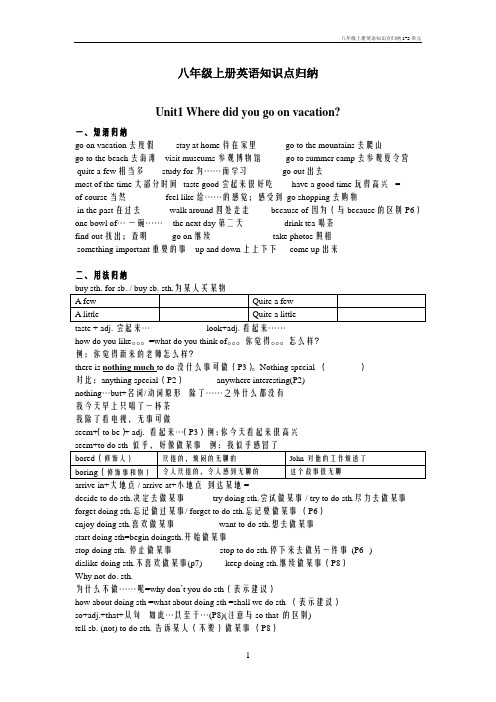
八年级上册英语知识点归纳Unit1 Where did you go on vacation?一、短语归纳go on vacation去度假stay at home待在家里 go to the mountains去爬山go to the beach去海滩 visit museums 参观博物馆go to summer camp去参观夏令营quite a few相当多 study for为……而学习go out出去most of the time大部分时间taste good尝起来很好吃have a good time玩得高兴 =of course当然 feel like给……的感觉;感受到go shopping去购物in the past在过去walk around四处走走because of因为(与 because的区别P6)one bowl of…一碗…… the next day第二天drink tea喝茶find out找出;查明 go on继续 take photos照相something important重要的事 up and down上上下下come up出来二、用法归纳taste + adj. 尝起来…look+adj. 看起来……how do you like。
=what do you think of。
你觉得。
怎么样?例:你觉得新来的老师怎么样?there is nothing much to do没什么事可做(P3)。
Nothing special ()对比:anything special(P2)anywhere interesting(P2)nothing…but+名词/动词原形除了……之外什么都没有我今天早上只喝了一杯茶____________________________________________________我除了看电视,无事可做_____________________________________________seem+(to be)+ adj. 看起来…(P3)例:你今天看起来很高兴____________________________arrive in+大地点 / arrive at+小地点到达某地 =decide to do sth.决定去做某事try doing sth.尝试做某事 / try to do sth.尽力去做某事forget doing sth.忘记做过某事/ forget to do sth.忘记要做某事(P6)enjoy doing sth.喜欢做某事want to do sth.想去做某事start doing sth=begin doingsth.开始做某事stop doing sth. 停止做某事stop to do sth.停下来去做另一件事(P6 )dislike doing sth.不喜欢做某事(p7) keep doing sth.继续做某事(P8)Why not do. sth.为什么不做……呢=why don’t you do sth(表示建议)how about doing sth =what about doing sth =shall we do sth (表示建议)so+adj.+that+从句如此…以至于…(P8)(注意与so that 的区别)tell sb. (not) to do sth. 告诉某人(不要)做某事(P8)too many/ too much/ much too 三者的区别below/above()bring/take()P5三、语法归纳1)用于肯定句的是:用于否定句和疑问句的是:2)不定代词呗形容词和不定式修饰是,修饰词应该置于不定代词之_____,即_________ 我有重要的事情要告诉你:I have我的自行车有毛病:There is with my bike.3)不定代词做主语谓语动词用___________有人在等你:4)表示请求,询问,希望得到比人肯定的回答。
初二英语一二单元知识点总结
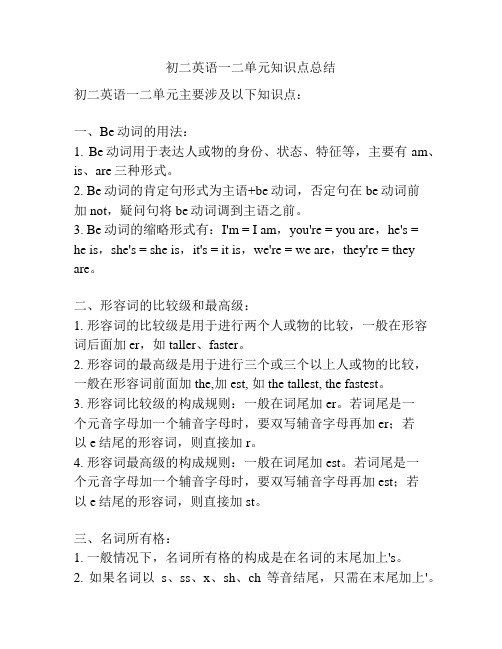
初二英语一二单元知识点总结初二英语一二单元主要涉及以下知识点:一、Be动词的用法:1. Be动词用于表达人或物的身份、状态、特征等,主要有am、is、are三种形式。
2. Be动词的肯定句形式为主语+be动词,否定句在be动词前加not,疑问句将be动词调到主语之前。
3. Be动词的缩略形式有:I'm = I am,you're = you are,he's =he is,she's = she is,it's = it is,we're = we are,they're = they are。
二、形容词的比较级和最高级:1. 形容词的比较级是用于进行两个人或物的比较,一般在形容词后面加er,如taller、faster。
2. 形容词的最高级是用于进行三个或三个以上人或物的比较,一般在形容词前面加the,加est, 如the tallest, the fastest。
3. 形容词比较级的构成规则:一般在词尾加er。
若词尾是一个元音字母加一个辅音字母时,要双写辅音字母再加er;若以e结尾的形容词,则直接加r。
4. 形容词最高级的构成规则:一般在词尾加est。
若词尾是一个元音字母加一个辅音字母时,要双写辅音字母再加est;若以e结尾的形容词,则直接加st。
三、名词所有格:1. 一般情况下,名词所有格的构成是在名词的末尾加上's。
2. 如果名词以s、ss、x、sh、ch等音结尾,只需在末尾加上'。
3. 如果名词以s结尾,且是复数形式,只需在末尾加上'。
4. 如果两个或两个以上的名词共享同一个所有格,只需在最后一个名词的末尾加's。
四、基数词和序数词:1. 基数词用来表示数目的数量,如one、two、three等。
2. 序数词用来表示顺序,如first、second、third等。
五、时间的表达:1. 用at表示具体时刻,如at 7 o'clock,在准点时刻;2. 用on表示具体日期,如on Monday,在某一天;3. 用in表示具体月份、季节、年份,如in June,在某个月;4. 用ago表示多长时间之前,如two days ago,两天之前;5. 用from...to/till/until表示时间的起止点,如from Monday to Friday,从周一到周五。
八年级上册英语一二单元知识点

八年级上册英语一二单元知识点八年级上册英语一二单元知识点考点英语是国际通用语言,掌握英语可以更好地进行国际交流,拓展人际关系。
那么,以下是我为大家带来的八年级上册英语一二单元知识点考点,欢迎参阅呀!八年级上册英语一二单元知识点考点Unit 1.How often do you exercise?I. 重点短语归纳:on weekends 在周末1. go to the movies 去看电影2. look after=take care of 照顾3. surf the internet 上网4. healthy lifestyle 健康的生活方式5. go skateboarding 去滑滑板watch TV看电视6. keep healthy=stay healthy = keep in good health 保持健康 keep + 形容词表保持某种状态do some reading 阅读7. exercise= take/do (much) exercise=do sports锻炼8. eating habits 饮食习惯9. take more exercise 做更多的运动10. the same as 与什么相同11. once a month一月一次12. be different from 不同13. twice a week一周两次.three times a week一周三次14. make a difference to 对什么有影响As teachers, you must believe that you can make a difference to the lives of your students.身为教师,你们必须坚信你们能够影响学生的一生。
A false step will make a great difference to my future.错走一步对我的前程来说会产生很大影响。
Unit1--Unit2知识点总结人教版英语八年级上册

人教版八英上Unit1总结Where did you go on vacation?Section AB重点单词及词类变形1.wonderful adj. 精彩的;绝妙的wonder n.惊奇;奇迹wonderfully精彩地;绝妙地wonder v.想知道;琢磨wonder about想知道;考虑2.enjoyable adj.enjoy doing享受做某事enjoy oneself玩地愉快3.decide v.决定;选定decision n.decide on/upon sth.决定某事decide (not) to do sth. 决定(不)做某事;make a decision to do sth 做决定某事4.building n.建筑物;房子5.trader /'treɪdə/n.商人trade n.贸易;买卖v.做生意6.difference n.差别;差异different adj.make a difference有影响;有关系7.wait v.等待;等候waiter男服务员waitress女服务员重点词汇用法2).some...一般用语肯定句,any...一般疑否句3).形容词修饰不定代词,放不定代词后面如:something new2.few、a few +可数名词复数little、a little +不可数名词a little=kind of+形/副词有点...few little表示否定a few a little表示肯定:第一二人称:形代+self/selves单数:myself ;yourself;复数:ourselves yourselves第三人称:宾格+self/selves单数:himself ;herself;itself复数:themselvesteach oneself 自学=learn by oneself自学enjoy oneself玩的愉快hurt oneself伤着自己help oneself to+食物自便...e to oneself苏醒by oneself 独自4.seem+adj./n.似乎是……seem+to do sth.好像……It seems that...好像……5.enjoy doingenjoy oneself玩的愉快enjoyable adj. enjoyably adv.P11.stay at home呆在家里2.visit museum 参观博物馆visitor 参观者3.go on vacation==take/have a vacation/holidaybe on vacation在度假P24.go out with+某人和...一起外出5.study for a test备考study for...为...学习6.long time no see好久不见7.quite a few photos很多照片8.what about=how about后跟人称代词宾格或动词ing形式9.not really并不是11.most of +名词:做主语时,谓语动词单复数与名词一致P3How do you like+事物?=How do you feel about+事物?=what do you think of+事物13.my first time我第一次...14.buy...for为...买(与for搭配的词:cook make)15.the only problem is that...唯一的问题是...16.sb./sth have/has nothing to do but do...除了做...无事可做there be nothing to do but do...17.keep a diary记日记Section B重点单词及词类变形18.decide (not) to do sth. 决定(不)做某事decide onmake a decision to do sth. 决定做某事have a try试一试try out 选拔try on 试穿20.feel like doing sth.=want/would like to do sth.希望做某事;喜欢做某事22.trade v. 经商trader n. 商人23.wonder v.想知道n.奇迹;奇观wonderful adj.精彩的wonderfully adv.24.different adj.不同的be different from与...不同difference n.差异;不同点make a difference to 对......有影响;起作用25.enough adv.足够地;充足地enough+名词形/副词+ enoughbe enough (for sb.) to do sth对某人来说做某事足够……。
八年级上英语一二单元总结

八年级上英语一二单元总结一、重点短语1. how often 多久一次2. once a week 一周一次3. twice a month 一个月两次4. three times a day 一天三次5. make a list 制定清单6. help yourself to some fish 请随便吃点鱼7. give sb. a surprise 给某人一个惊喜8. go for a walk 去散步9. shop for groceries 买日常用品10. do some cooking 做饭11. do some washing 洗衣服12. do some cleaning 打扫卫生13. do some reading 阅读14. as for me 对于我来说15. want to do sth 想做某事二、重点句型1. What time do you usually go to school? 你通常几点去上学?2. I usually go to school at seven o’clock. 我通常七点去上学。
3. What about you? 你呢?4. How do you usually go to school? 你通常怎样去上学?5. I usually go to school by bike. 我通常骑自行车去上学。
6. How often do you watch TV? 你多久看一次电视?7. I watch TV every day. 我每天都看电视。
8. How many hours do you watch TV every week? 你每周看多少小时电视?9. I watch TV for about two hours every week. 我每周看大约两个小时电视。
10. What do you usually do on weekends? 你通常在周末做什么?11. I usually go shopping on weekends. 我通常在周末购物。
八年级英语上册unit1、2单元知识点

八年级英语上册各单元知识点Unit11.Someone, something, somewhere/anyone, anything, anywhere/everyone,everything, everywhere/no one, nothing, nowhere,不定代词的用法总结:不定代词有特点,修饰词语放后边,用作主语谓单三例1:I want to do ______ _______ (something interesting/interesting something)例2:Everyone ____(is / are)here. 例3:Everything ________ (tastes/taste)good.2.好久没见Long time no see!3.在度假be on vacation4.上个月last month5.相当多quite a few+可数名词复数6.拍照take photos7.呆在家里stay at home8.大多数时间most of the time9.给某人买某物buy sb. sth./ buy sth. for sb.(先说人直接连,先说物介词填)例:I want to buy a book for my sister.=I want to buy my sister a book.10.做某事很愉快have a good time doing sth.=have fun doing sth.=enjoy oneself doing sth.例: I have a good time playing basketball.=I have fun playing basketball.=I enjoy myself playing basketball.11.听起来sound;尝起来taste;闻起来smell;看起来look;摸起来feel(都是系词)+形容词例:That sounds good; It tastes wonderful; It smells terrible; she looks young; It feels cold.12.你觉得...怎么样?What do you think of...?=How do you like ...?13.第一次做某事It’s the first time to do sth. 例:It’s my first time to ea t durian. Although it smells terrible, it tastes really good.14.你的假期怎么样?How was your vacation?15.除了……什么都没有(只有……):nothing but+名词/动词原形例:he has nothing but books(他除了书什么都没有);You can do nothing but read in the library(你在图书馆里只能读书)16.似乎……:seem+形容词;seem to do; it seems that+句子She seems very happy. /She seems to be happy. /It seems that she is happy.她似乎很开心17.去度假go on vacation;在度假be on vacation18.到达arrive in/at=reach=get to19.决定做某事decide to do =make a decision to do ; 决定不做某事:decide not to do sth.20.尝试做某事try doing sth. 努力做某事try to do sth. 尽某人最大努力做某事try on e’s best to do sth.21.想要做某事feel like doing sth.= would like to do sth. 另外:feel like 还可以表示“感觉像”后跟名词或句子。
八年级英语上册第一、二单元知识点总结(新目标版英语)
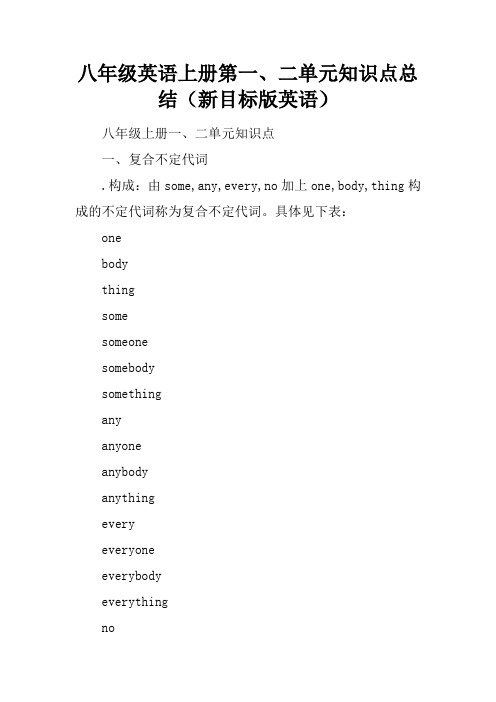
八年级英语上册第一、二单元知识点总结(新目标版英语)八年级上册一、二单元知识点一、复合不定代词.构成:由some,any,every,no加上one,body,thing构成的不定代词称为复合不定代词。
具体见下表:onebodythingsomesomeonesomebodysomethinganyanyoneanybodyanythingeveryeveryoneeverybodyeverythingnonoonenobodynothing2.用法:(1)复合不定代词被形容词、动词、不定式等修饰时,要放在它们的后面。
Ihavesomethingimportanttotellyou.我有重要的事情要告诉你。
Thereisnothingwrongwiththeradio.这个收音机没有毛病。
Doyouwantanythingtodrink?你想喝点什么吗?(2)复合不定代词作主语时,谓语动词用单数形式。
Everythingbeginstogrowinspring.春天万物开始生长。
Someoneiswaitingforyouatthedoor.有人在门口等你。
(3)肯定句中用含some,疑问句和否定句中用含any。
但在表示请求、建议、反问等的疑问句中,常用含有some 的不定代词。
wouldyoulikesomethingtoeat?你想要些吃的东西吗?(4)anyone,anything也可以用在肯定句中,前者表示“任何人”,后者表示“任何事”。
Anyonecandothis.任何人都会做这个。
Icananythingforyou.我能为你做任何事。
3.goonvacation“去度假”;vacation同义词为holiday,意为“假期”。
beonvacation“在度假”。
IwanttogoonvacationinHainanthiswinter.今年冬天我想去海南度假。
Theyareonvacationattheseaside.他们正在海边度假。
人教版八年级英语上第一、二单元重点笔记
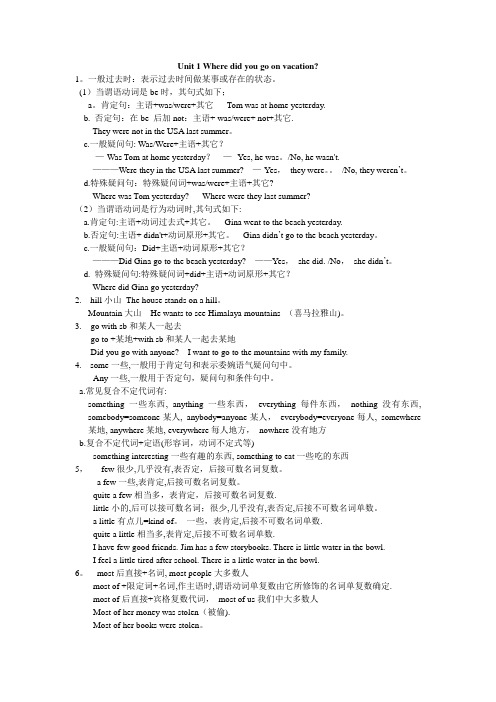
Unit 1 Where did you go on vacation?1。
一般过去时:表示过去时间做某事或存在的状态。
(1)当谓语动词是be时,其句式如下;a。
肯定句:主语+was/were+其它Tom was at home yesterday.b. 否定句:在be 后加not:主语+ was/were+ not+其它.They were not in the USA last summer。
c.一般疑问句: Was/Were+主语+其它?-—-Was Tom at home yesterday?—--Yes, he was。
/No, he wasn't.———Were they in the USA last summer? —-Yes,they were。
/No, they weren’t。
d.特殊疑问句:特殊疑问词+was/were+主语+其它?Where was Tom yesterday? Where were they last summer?(2)当谓语动词是行为动词时,其句式如下:a.肯定句:主语+动词过去式+其它。
Gina went to the beach yesterday.b.否定句:主语+ didn't+动词原形+其它。
Gina didn’t go to the beach yesterday。
c.一般疑问句:Did+主语+动词原形+其它?———Did Gina go to the beach yesterday? ——Yes,she did. /No,she didn’t。
d. 特殊疑问句:特殊疑问词+did+主语+动词原形+其它?Where did Gina go yesterday?2. hill小山The house stands on a hill。
Mountain大山He wants to see Himalaya mountains (喜马拉雅山)。
英语初二一到六知识点归纳
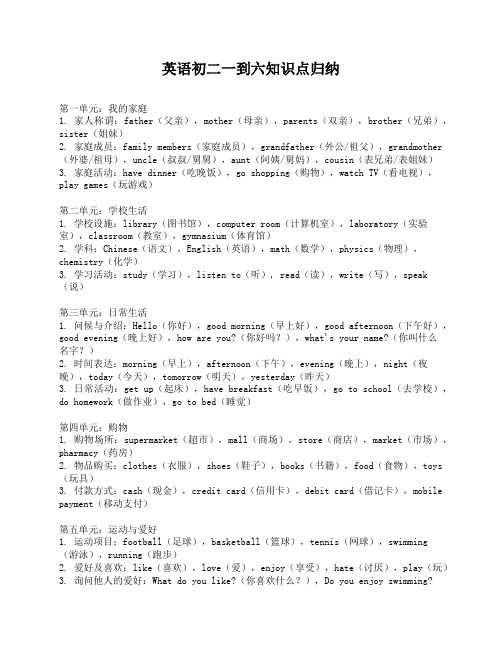
英语初二一到六知识点归纳第一单元:我的家庭1. 家人称谓:father(父亲),mother(母亲),parents(双亲),brother(兄弟),sister(姐妹)2. 家庭成员:family members(家庭成员),grandfather(外公/祖父),grandmother (外婆/祖母),uncle(叔叔/舅舅),aunt(阿姨/舅妈),cousin(表兄弟/表姐妹)3. 家庭活动:have dinner(吃晚饭),go shopping(购物),watch TV(看电视),play games(玩游戏)第二单元:学校生活1. 学校设施:library(图书馆),computer room(计算机室),laboratory(实验室),classroom(教室),gymnasium(体育馆)2. 学科:Chinese(语文),English(英语),math(数学),physics(物理),chemistry(化学)3. 学习活动:study(学习),listen to(听), read(读),write(写),speak (说)第三单元:日常生活1. 问候与介绍:Hello(你好),good morning(早上好),good afternoon(下午好),good evening(晚上好),how are you?(你好吗?),what's your name?(你叫什么名字?)2. 时间表达:morning(早上),afternoon(下午),evening(晚上),night(夜晚),today(今天),tomorrow(明天),yesterday(昨天)3. 日常活动:get up(起床),have breakfast(吃早饭),go to school(去学校),do homework(做作业),go to bed(睡觉)第四单元:购物1. 购物场所:supermarket(超市),mall(商场),store(商店),market(市场),pharmacy(药房)2. 物品购买:clothes(衣服),shoes(鞋子),books(书籍),food(食物),toys (玩具)3. 付款方式:cash(现金),credit card(信用卡),debit card(借记卡),mobile payment(移动支付)第五单元:运动与爱好1. 运动项目:football(足球),basketball(篮球),tennis(网球),swimming(游泳),running(跑步)2. 爱好及喜欢:like(喜欢),love(爱),enjoy(享受),hate(讨厌),play(玩)3. 询问他人的爱好:What do you like?(你喜欢什么?),Do you enjoy swimming?(你喜欢游泳吗?)第六单元:节假日与活动1. 节日:Spring Festival(春节),Mid-Autumn Festival(中秋节),National Day (国庆节),Christmas(圣诞节)2. 庆祝活动:have a party(开派对),watch fireworks(看烟花),eat mooncakes (吃月饼),exchange gifts(交换礼物)3. 知名节日:New Year's Day(元旦),Thanksgiving Day(感恩节),Easter(复活节),Halloween(万圣节)以上是初二英语一到六单元的知识点归纳,希望能对你有所帮助。
八年级英语第一二单元知识归纳总结
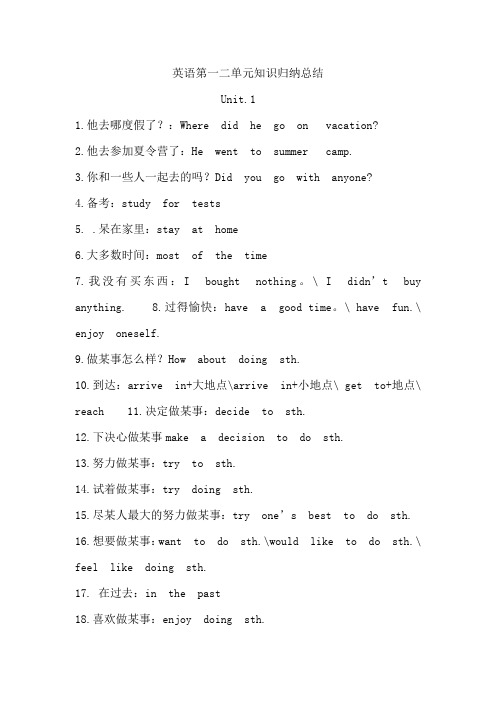
英语第一二单元知识归纳总结Unit.11.他去哪度假了?:Where did he go on vacation?2.他去参加夏令营了:He went to summer camp.3.你和一些人一起去的吗?Did you go with anyone?4.备考:study for tests5. .呆在家里:stay at home6.大多数时间:most of the time7.我没有买东西:I bought nothing。
\ I didn’t buy anything. 8.过得愉快:have a good time。
\ have fun.\ enjoy oneself.9.做某事怎么样?How about doing sth.10.到达:arrive in+大地点\arrive in+小地点\ get to+地点\ reach 11.决定做某事:decide to sth.12.下决心做某事make a decision to do sth.13.努力做某事:try to sth.14.试着做某事:try doing sth.15.尽某人最大的努力做某事:try one’s best to do sth.16.想要做某事:want to do sth.\would like to do sth.\ feel like doing sth.17. 在过去:in the past18.喜欢做某事:enjoy doing sth.19.开始做某事:start to sth.20. .too many、too much、much .too 的区别:too many修饰可数名词;too much修饰不可数名词;much .too修饰形容词.21.enough与n.和adj.的位置关系:enough放与n.之前;adj.之后。
22.不定代词与adj.的位置关系:不定代词放于adj.之前。
23.他好像感冒了:It seems that he has a cold \He seems to have a cold24.because与because of的区别:because后接句子;because of后接单词或词组。
八年级上册英语第一单元和第二单元中的语法

八年级上册英语第一单元和第二单元中的语
法
第一单元中的语法主要包括:
1.一般现在时:用于陈述客观事实、经常性行为或习惯动作。
如:
I play tennis every Sunday.
2.现在进行时:表示现阶段正在进行的动作。
如:She is
reading a book now.
3.句型:There be句型,用来表达某处存在某物。
如:There is
a pen on the desk.
4.数词的用法:用于描述数量。
如:two hundred, one million。
5.疑问句的结构:用来询问信息或确认某事情。
如:Where is
your bag?
第二单元中的语法主要包括:
1. be动词的过去式:用于表示过去发生的动作或状态。
如:He was a teacher before.
2.一般过去时:用于叙述过去发生的动作或状态。
如:I went to the park yesterday.
3.一般将来时:用于表示将来要发生的动作或存在的状态。
如:She will come back later.
4. be going to结构:表示将要做某事的计划或打算。
如:They are going to have a picnic tomorrow.
5.从句:用于描述原因、目的、结果等。
如:He ran fast because he was late.。
八年级英语下册必背知识点(第一二单元)
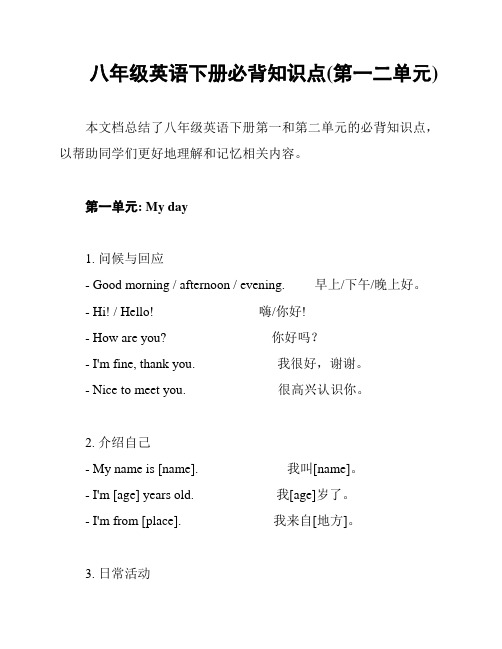
八年级英语下册必背知识点(第一二单元)本文档总结了八年级英语下册第一和第二单元的必背知识点,以帮助同学们更好地理解和记忆相关内容。
第一单元: My day1. 问候与回应- Good morning / afternoon / evening. 早上/下午/晚上好。
- Hi! / Hello! 嗨/你好!- How are you? 你好吗?- I'm fine, thank you. 我很好,谢谢。
- Nice to meet you. 很高兴认识你。
2. 介绍自己- My name is [name]. 我叫[name]。
- I'm [age] years old. 我[age]岁了。
- I'm from [place]. 我来自[地方]。
3. 日常活动- get up 起床- have breakfast 吃早餐- go to school 上学- have lunch 吃午餐- do homework 做作业- have dinner 吃晚餐- go to bed 上床睡觉4. 时间表达- What time is it? 几点了?- It's [time]. 是[时间]。
5. 数字表达- zero 零- one 一- two 二- three 三- four 四- five 五- six 六- seven 七- eight 八- nine 九- ten 十第二单元: School life1. 学科与课程- Chinese 语文- Mathematics 数学- English 英语- Science 科学- Geography 地理- History 历史- Art 艺术- Music 音乐- Physical Education (PE) 体育2. 教室用语- Open your book. 打开你的书。
- Close your book. 关上你的书。
八上英语一二单元知识点汇总
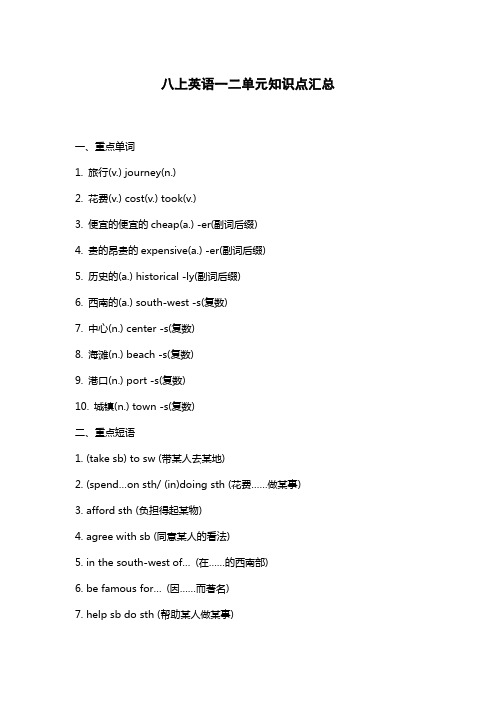
八上英语一二单元知识点汇总一、重点单词1. 旅行(v.) journey(n.)2. 花费(v.) cost(v.) took(v.)3. 便宜的便宜的cheap(a.) -er(副词后缀)4. 贵的昂贵的expensive(a.) -er(副词后缀)5. 历史的(a.) historical -ly(副词后缀)6. 西南的(a.) south-west -s(复数)7. 中心(n.) center -s(复数)8. 海滩(n.) beach -s(复数)9. 港口(n.) port -s(复数)10. 城镇(n.) town -s(复数)二、重点短语1. (take sb) to sw (带某人去某地)2. (spend…on sth/ (in)doing sth (花费……做某事)3. afford sth (负担得起某物)4. agree with sb (同意某人的看法)5. in the south-west of…(在……的西南部)6. be famous for…(因……而著名)7. help sb do sth (帮助某人做某事)8. feel+形容词(宾语从句) (感觉到某事物)9. a place where+从句(一个……的地方)10. as+adj.+as possible (尽可能……地)三、重点句型1. It is +adj+for sb+to do sth 对某人来说做某事……的。
2. What+adj+名词+主语+be? ……怎么样?3. How+adj/adv+主语+be? ……怎么样?4. There are many different kinds of/places…(有很多不同种类的/地方……)5. I’m sure/I believe that…(我相信……)6. Would you like to do sth? (你愿意做某事吗?)。
八年级一二单元知识点英语

八年级一二单元知识点英语As an eighth grader, it is important to master all the knowledge covered in the first two units of English. Here are some key points that you should focus on.1. TensesIn the first unit, we learnt about the three basic tenses in English: present, past and future. It is crucial to understand when to use each tense and how to form them correctly. Moreover, we need to be familiar with irregular verbs which do not follow the usual pattern of adding -ed to form the past tense. Be sure to practice using tenses in various contexts, such as writing diary entries, composing emails, and giving presentations.2. ModalsIn addition to tenses, we also explored modals which express ability, permission, obligation, possibility, and advice. Modals are versatile and make your language more nuanced and polite. For instance, when you are asking for a favor, you can say "Could you please...?" instead of "Can you...?" to show more respect. When you are making suggestions, you can use "should" or "could" to avoid sounding bossy or imposing.Therefore, mastering modals is essential in order to communicate effectively and appropriately.3. Adjectives and AdverbsIn the second unit, we delved into the world of adjectives and adverbs. Adjectives describe nouns or pronouns, while adverbs modify verbs, adjectives, or other adverbs. Using descriptive and vivid language can enhance the richness and clarity of your writing and speaking. However, we need to be aware of the order of adjectives and the difference between adjectives and adverbs. Furthermore, we need to avoid overusing adjectives and adverbs and make them relevant and concise.4. ConjunctionsAnother important topic in the second unit is conjunctions which connect words, phrases, and clauses together. Some common conjunctions include "and," "but," "or," "because," "if," and "although." Using conjunctions can create complicated sentences and express complicated ideas. However, we also need to use them appropriately and avoid run-on sentences or sentence fragments. Practice using conjunctions and analyzing their functions in various texts can help us improve our language skills.5. Reading and Writing StrategiesLastly, we also learned about reading and writing strategies in these two units. In order to comprehend and analyze texts effectively, we need to use various skills such as skimming, scanning, predicting, inferring, and summarizing. We also need to be aware of the text structure, such as the main idea and supporting details, the cause-and-effect relationship, and transition words. Similarly, to write coherent and persuasive texts, we need to plan, organize, revise, and edit our writing carefully. We also need to use some techniques such as repetition, parallelism, rhetorical questions, and anecdotes to engage our readers.In conclusion, the first two units of English cover a wide range of knowledge and skills. To succeed in learning English, we need to be patient, persistent, and proactive. Remember to practice regularly and seek help from your teachers or classmates when you encounter difficulties. With the right attitude and effort, you can become a competent and confident English user.。
- 1、下载文档前请自行甄别文档内容的完整性,平台不提供额外的编辑、内容补充、找答案等附加服务。
- 2、"仅部分预览"的文档,不可在线预览部分如存在完整性等问题,可反馈申请退款(可完整预览的文档不适用该条件!)。
- 3、如文档侵犯您的权益,请联系客服反馈,我们会尽快为您处理(人工客服工作时间:9:00-18:30)。
第一单元:用英语解释句子:Module 11. My father is forty-two years old. My mother is forty-two years old, too.__________________________________________________2. My grandmother and I share a flat.______________________________________________________________3. My family is smaller than yours.______________________________________________________________4. What job do you do?__________5. Do you want to work as a fireman?_____________________________________________________________6. She works as a teacher.______________________________________________________________7. John is a driver. He drives a taxi._____________________________________________________________8. What do you do this job for?________________________________________________________9. My brother is younger than me.____________________________________________________________10. My sister looks shorter than yours._____________________________________________________11.I prefer apples to bananas.__________________________________________________________12. Peter likes English best._____________________13 Y ou must look after the dog well.________________________________________________________14. Li Ping is the tallest boy in his class.____________________________________________________________15. Our class has 52 students.____________________16. The booklet told you how you should look after the pets well._____________________________________________________________17.We live in the same room.____________________________________________________________18. Kitty and Alice usually go to school together._______________________________________________________19.They had no food or drink.____________________________________________________________20.He is twelve years old. I’m twelve years old, too._____________________________________________________________21. How do you like Shenzhen?________________________________________________________________22. I help you and you help me.________________________________________________________23. We should not be cruel to the animals._________________________________________________________Module 21. I can’t see any people here._________________2. There is no milk in the cup._______________________3. She has no brothers._________________________4. I didn’t see any traffic on the road when I w ent home last night.__________________________________________________________5. Peter lives far away from school._______________________________________________________________6. It takes Peter almost 40 minutes to get to school every day.________________________________________________________________ 7. It took him 30 minutes to clean the classroom yesterday.______________________________________________________________8. It will take me 100 yuan to buy the dictionary._________________________________________________________________ 9. We spend twenty minutes reading English or Chinese every morning._____________________________________________________10. Her parents paid 50 dollars for the bicycle.__________________________________________________________11.The books cost them five thousand dollars.________________________________________________________12. Danny bought the toy train for 20 yuan.____________________________________________________________ Module 31. Don’t walk on the grass.________________________________________________________________2. He crossed the road at the crossing._______________________________________________________________3. Walk quichly._____________4. Don’t talk loudly in class.___________________________________________________________________ 5. We must keep the class rules._______________________________________________________________6. Shall we go to the library?______________________________________________________________7. Can I help you ?___________8. I’d like a flat with a garden.__________________9. He takes the underground to go to school.___________________________________________________________10. He walked to school yesterday.__________11. I looked for you everywhere just now.__________________________________________________参考答案:Module 11. My father is forty-two years old. My mother is forty-two years old, too.=My father is as old as my mother.=My father and my mother are both forty-two years old.2. My grandmother and I share a flat.=My grandmother and I live in the same flat.3. My family is smaller than yours.=Y our family is bigger than mine.4. What job do you do?=What is your job?=What are you?5. Do you want to work as a fireman?=Would you like to be a fireman?6. She works as a teacher.=She is a teacher.7. John is a driver. He drives a taxi.=John is a taxi-driver.8. What do you do this job for?=Why do you do this job?9. My brother is younger than me.=I am older than my brother.10. My sister looks shorter than yours.=Y our sister looks taller than mine.11.I prefer apples to bananas.=I like apples better than bananas.12. Peter likes English best.=Peter’s f avourite subject is English.13 Y ou must look after the dog well.=Y ou must take good care of the dog.14. Li Ping is the tallest boy in his class.=Li Ping is taller than any other boy in his class.= Li Ping is taller than the other boys in his class.15. Our class has 52 students.=There are 52 students in our class.16. The booklet told you how you should look after the pets well.=The booklet told you how to take good care of the pets.17.We live in the same room.=We share a room.18. Kitty and Alice usually go to school together.=Kitty usually goes to school with Alice.19.They had no food or drink.=They didn’t have food or drink.20.He is twelve years old. I’m twelve years old, too.=He is as old as me.=He is twelve years old,so am I.=He and I are both twelve years old.21. How do you like Shenzhen?=What do you think of Shenzhen?22. I help you and you help me.=We help each other.23. We should not be cruel to the animals.=We should be kind to the animals.Module 21. I can’t see any people here.=I can see nobody here.2. There is no milk in the cup.=There is not any milk in the cup.3. She has no brothers.=She has not any brothers.4. I didn’t see any traffic on the road when I went home last night.=5. Peter lives far away from school.=Peter lives near school.6. It takes Peter almost 40 minutes to get to school every day.=Peter spends almost 40 minutes (in) getting to school every day.7. It took him 30 minutes to clean the classroom yesterday.=He spent half an hour (in) cleaning the classroom yesterday.8. It will take me 100 yuan to buy the dictionary.=The dictionary will cost me 100 yuan.=I will spend 100 yuan on the dictionary=I will pay 100 yuan for the dictionary.9. We spend twenty minutes reading English or Chinese every morning.=It takes us twenty minutes to read English or Chinese every morning.10. Her parents paid 50 dollars for the bicycle.=The bicycle cost her parents 50 dollars.11.The books cost them five thousand dollars.=I spent five thousand dollars on the books.=They spent five thousand dollars on the books.12. Danny bought the toy train for 20 yuan.=Danny paid 20 yuan for the toy train.Module 31. Don’t walk on the grass.=Don’t step on the grass.2. He crossed the road at the crossing.=He walked across the road at the crossing.3. Walk quickly.=Be quick.=Don’t walk slowly.4. Don’t talk loudly in class.=Keep quiet in class.5. We must keep the class rules.=We mustn’t break the class rules.6. Shall we go to the library?=Let’s go to the library.=Why not go to the library?=What about going to the library?7. Can I help you ?=What can I do for you?8. I’d like a flat with a garden.=I want a flat with a garden.9. He takes the underground to go to school.=He goes to school by underground10. He walked to school yesterday.=He went to school on foot.11. I looked for you everywhere just now.=I looked for you here and there a moment ago.King Hiero asked a crown-maker to make him a gold crown,but when the king __1___ the crown,he asked himself,"Is the crown made completely of gold?"Then the king ___2___ the crown to Archimedes,the best scientist in the kingdom.Archimedes thought the problem __3__ a slave pourded some water into a bath for him.Archimedes got in the bath and some water came out of it,onto the floor."That's it!"shouted Archimedes."Some of the water will ___4__ when we put an object in water.The object __5___ the water.A big object will displace a lot of water.A small object will displace only a little water."How excited Archimedes was!Archimedes went to the palace __6__ the crown.It weigh only one kilogram.He put the crown in a pot of water.Five centimetres of water came out.Then he put one kilogram of gold in ___7__ pot of water.Three centimetres of water came out of this pot.Archimedes said to King Hiero,"Silver __8__ the crown bigger. The crown displaced __9__ water so it is not made completely of gold.It is made of both gold and silver."King Hiero became very __10__ when he heard this,and he sent the crown-maker to prison.1 a got b took c bought d brought2 a carried b sent c took d brought3 a before b after c while d as soon as4 a carry out b run out c open out d move out5 a diaplaces b places c move d create6 a weigh b to weigh c weight d to weight7 a other b the other c another d others8 a making b to make c be made d made9 a more b least c less d fewer10 a surprised b angry c happy d amazed参考译文:海尔拉国王要一个王冠制造者为他做一个黄金王冠,当他__1__这个王冠时,他自问,"这个时全金打造的吗?"后来这个国王__2__这个王冠给阿基米德--------王国中最棒的科学家。
